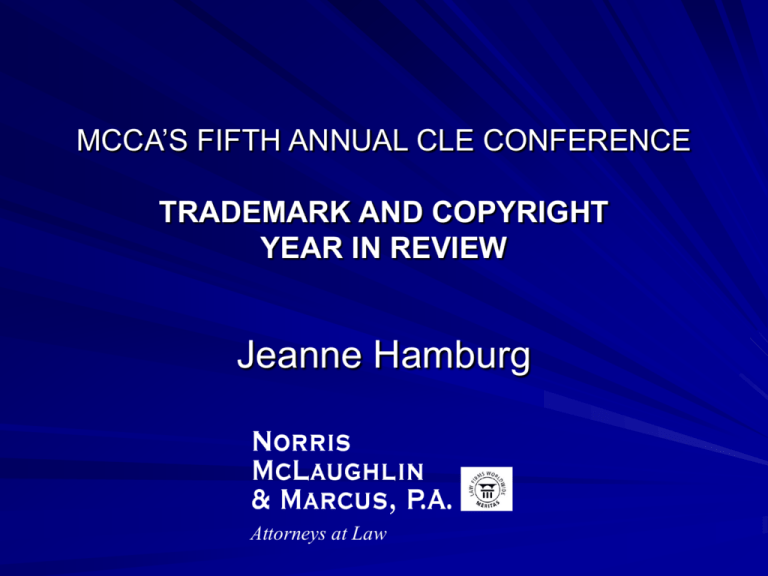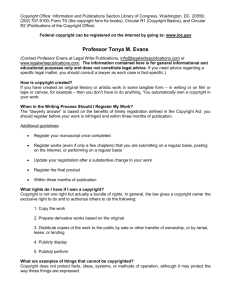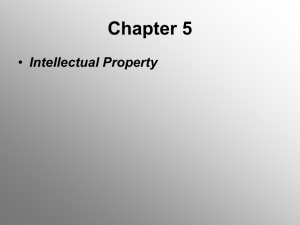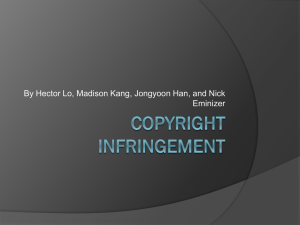mcca's fifth annual cle conference trademark and copyright year
advertisement

MCCA’S FIFTH ANNUAL CLE CONFERENCE TRADEMARK AND COPYRIGHT YEAR IN REVIEW Jeanne Hamburg Attorneys at Law “Fair Use” of Trademarks: KP Permanent Makeup v. Lasting Impression I, Inc. 125 S.Ct. 542 (2004) The alleged infringer, KP, began using a logo for permanent makeup for the logo depicted immediately below: The trademark owner, Lasting, owned a registration for the following logo: Permanent makeup is commonly referred to as “micropigmentation”. Attorneys at Law “Fair Use” of Trademarks: KP Permanent Makeup v. Lasting Impression I, Inc. The parties had been using the marks “MICROCOLOR” and “MICROCOLORS” concurrently for over one decade. Litigation was prompted when KP changed its brochure to stylize MICROCOLORS in the fashion set forth above; KP brought DJ action after Lasting and its licensee demanded discontinuation of the stylized logo. Summary judgment was granted in KP’s favor and then reversed by Ninth Circuit on the grounds that fact issues as to likely confusion precluded fair use. Attorneys at Law “Fair Use” of Trademarks: KP Permanent Makeup v. Lasting Impression I, Inc. Question Presented: “the significance of likely confusion for a fair use defense to a trademark infringement claim, and the obligation of a party defending on that ground to show that its use is unlikely to cause consumer confusion.” The Circuits had split on the issue. Attorneys at Law “Fair Use” of Trademarks: KP Permanent Makeup v. Lasting Impression I, Inc. Held: Trademark owner who demonstrates that the alleged infringer’s use of a trademark is likely to cause consumer confusion may nonetheless fail to establish trademark infringement. Rather, if the fair use proponent shows that it used the designation not as a trademark identifying its products, but, instead, in a purely descriptive way—to wit, a fair use—it can escape liability. Attorneys at Law “Fair Use” of Trademarks: KP Permanent Makeup v. Lasting Impression I, Inc. Court’s rationale: – Lanham Act Definition: “Use of the name, term, or device charged to be an infringement is use, otherwise than as a mark, …. Of a term or device which is descriptive of and used fairly and in good faith only to describe the goods or services of such party, or their geographic origin” 15 U.S.C. § 1115(b)(4). Attorneys at Law “Fair Use” of Trademarks: KP Permanent Makeup v. Lasting Impression I, Inc. Court strictly construed the language of the defense, which does not include an absence of likely confusion. Also applied some common sense reasoning: since it’s the trademark owner’s burden to establish likelihood of confusion, the defense isn’t even applicable unless there is confusion. To rule the defense isn’t applicable in the only situation in which it becomes relevant, makes little sense. Attorneys at Law Implications of Decision KP Permanent Makeup v. Lasting Impression I, Inc. Wider invocation of fair use defense even where confusion is likely, even inevitable Rejection of judicial activism embodied by Ninth Circuit approach. Nominative fair use v. Classic fair use. – Nominative fair use=description of trademark owner’s product using trademark owner’s mark even if ultimately alleged infringer is describing its own goods/services. Example: “we sell Volkswagen® cars.” Consumer confusion irrelevant per 9th Cir. – “Classic fair use” = the fair use proponent’s description of its own products using another’s mark or one substantially similar to it, as in this case. Consumer confusion precludes per 9th Cir. Attorneys at Law Implications of Decision: KP Permanent Makeup v. Lasting Impression I, Inc. Likely confusion still plays a role in determining if fair use is established. Commercial need for use will also be considered, as well as the fame of the trademark owner’s mark. Any application to arbitrary/fanciful marks? Attorneys at Law Use of Trademarks as Keywords by Internet Search Engines Playboy Communications, Inc. v. Netscape Communications Corp., 354 F.3d 1020 (9th Cir. 2004) – Playboy sued Netscape and Excite because both offered search engines which allowed advertisers to purchase keywords including “playboy” and “playmate” and purchase links and banner ads which were displayed when these keywords were entered. The banner ads themselves did not show the keywords/marks. – Lower court granted sj in favor of search engines. Ninth Circuit reversed because of the likelihood of “initial interest confusion”. The consumer might not immediately realize that Playboy was not associated with the links and ads which appeared on entering the search terms. Therefore defs might be liable on a theory of direct/contributory tm infringement. Attorneys at Law Use of Trademarks as Keywords by Internet Search Engines Government Employees Insurance Co. v. Google (E.D. Va.) http://www.patentlyobviousblog.com/files/geico1215.txt – GEICO sued Google and Overture, both search engines, challenging their policy of selling “sponsored links” or links which advertisers purchased, to appear when GEICO’s name was entered into the search engine by an Internet user. During trial, at the close of plaintiff’s case, Google brought a motion for judgment as a matter of law. – The court found, in a bench ruling in December of last year which is supposed to be, but as yet has not been reduced to a written opinion, that the search engines could be held liable for sponsored links in which the GEICO mark appeared, but not those unadorned by the mark. The court found confusion likely only when the mark actually appeared in the linked ad. Attorneys at Law Use of Trademarks as Keywords by Internet Search Engines Open issues: – Significance of “initial interest confusion” How does a survey properly measure such confusion? Rejection of GEICO survey which relied for evidence of confusion on consumers’ view of web pages which contained both sponsored links adorned by the mark, and those which did not. – How is the fair use defense applied (if at all) to use of a mark as a key word? Attorneys at Law Copyright: P2P File Sharing Metro-Goldwyn Mayer Studios Inc. v. Grokster, 380 F.3d 1154 (9th Cir. 2004), certiorari granted. Argument on 3/29. – Grokster and Streamcast a/k/a musiccity.com are distributors of software (including Grokster and Kazaa) enabling P2P sharing of digitized files of sound recording, motion pictures and text. – Unlike Napster, the programs do not use a central file server; users deal directly with each other. – Group of copyright owners representing movie studios, record labels and authors with copyrights in much of the material being exchanged over P2P networks sued for copyright infringement. – District court granted summary judgment in favor of the distributors dismissing the copyright claims. Attorneys at Law Copyright: P2P File Sharing Issue: Should the distributors be liable on a theory of contributory and/or vicarious copyright infringement? Ninth Circuit held no. Elements of contributory infringement: (1) direct infringement by a primary infringer, (2) knowledge of the infringement, and (3) material contribution to the infringement. Elements of vicarious infringement: (1) direct infringement by a primary party, (2) a direct financial benefit to the defendant, and (3) the right and ability to supervise the infringers. Attorneys at Law Copyright: P2P File Sharing Distributors’ Knowledge of Infringing Activity and Purpose of Software – Notices of infringement by copyright owners to infringers do not show knowledge required to establish contributory infringement because they occurred after infringement had been accomplished. – Software had commercially significant non-infringing uses (sharing public domain material and material made available with permission). If software did not, then only constructive knowledge would be required--knowledge could be imputed from infringing uses. Attorneys at Law Copyright: P2P File Sharing Relationship of Distributor to Infringers: – Distributors also did not make material contribution to infringement (necessary for contributory infringement) because files not stored centrally, but by users and therefore distributor could not “shut down” access to the files upon discovering infringement. – No liability for vicarious copyright infringement because distributors had no right and ability to supervise the infringers even if they “turned a blind eye” to the infringer and were profiting from infringement. Attorneys at Law Copyright: Punitive Damages Issue within 2nd Cir and nationally: are punitive damages available (1) at all; (2) in statutory damage cases? Ripe for appellate review. Statutory damages must be elected, as an alternative to actual damages, prior to trial. Statutory damages are only available when a registration issues PRIOR to the commencement of an infringement. NO provision for punitive damages in Copyright Act. Only punitive measures explicitly set forth: award of statutory damages up to 150K due to willful infringement; attorneys’ fees. Attorneys at Law Copyright: Punitive Damages Blanch v. Koons, 329 F.Supp. 2d 568 (S.D.N.Y. 2004) – Permitted amendment of complaint in copyright infringement case to allege punitive damages. – Punitive damages available if jury could find malice or willful infringement when statutory damages are not sought or are unavailable. – Other SDNY cases adopt this approach but there is also a later UNREPORTED decision in SDNY stating that punitive damages are never available. Nicholls v. Tufkenian Import/Export Ventures, No. 04 CV 2110 (WHP) (Sept. 13, 2004). Attorneys at Law Copyright: Punitive Damages Lowry’s Reports Inc. v. Legg Mason Inc., 302 F.Supp.2d 455 (D.Ct. Md. 2004) – $20 million jury verdict in statutory and punitive damages awarded against subscriber, and in favor of publisher, of daily and weekly financial newsletter. Defendant subscriber distributed the report internally, via an intranet and email, without publisher’s permission and continued email distribution even after publisher’s written protest. Def. moved for new trial and judgment as a matter on grounds award excessive. – Jury award upheld; limitations on punitive damages awards set forth by the Supreme Court in BMW of North America v. Gore, 517 U.S. 559 (1996) do not apply to statutory damage awards under the Copyright Act. Attorneys at Law Copyright: Punitive Damages Implications of the split – Evidence of willfulness, previously only relevant in statutory damages cases, will, until the split is resolved, now be relevant in every case. – Greater potential damage awards even in cases where actual damages are difficult to prove and statutory damages are unavailable because a registration did not issue. – Strip Copyright Act of advantage of obtaining registration? Attorneys at Law Fair Use of Copyright MasterCard v. Nader Primary Committee, Inc., 70 U.S.P.Q2d 146 (2004) The Original MasterCard Ads “Priceless Ad” #1 – Baseball “Priceless Ad” #2 – High School Reunion “Priceless Ad” #3 – Mother-Daughter Trip “Priceless Ad” #4 – Twister The “Copy” Ralph Nader’s “Priceless Truth” Ad Attorneys at Law Analysis of Priceless Ads Identify the copyrightable expression – Selection and arrangement of creative expression (NOT ideas) including: Recitation of item colon price; and intangible that is priceless Sequence of images Placement and appearance of text within ad (i.e., over image) Use of voice over Sound of voice over “Look and feel” Analyze whether the alleged infringing use is “substantially similar” to original creative expression in the original Attorneys at Law Copyright and Fair Use Is it fair use or infringement? Sec. 107 of title 17 – Purpose of use: commercial? Not purely editorial. Contributions increased from $5,125 to $818,000 in one month period (from July to August, 2000 -- a 15 fold increase) after ad ran nationally. Ad directed viewers to web sites, make contributions. Parody? Does it comment on the original? Implications: if parody, borrowing is justified to make comment; if satire, less justification for copying since commentary is on society/cultural values. – Expert testimony What is the nature of the original work? – Creative work at core of copyright protection Amount/substantiality of portion taken: – How much original expression “borrowed” from the original? Does it displace market for the original? Attorneys at Law Copyright and Fair Use District Court Decision In Nader Took court four years to decide. Court never looked at many of the elements that were protectable in MasterCard ads beyond the terms “priceless” and “there are some things money can’t buy”. Court never closely applied parody/satire distinction (did not examine expert testimony opining ad was a satire, did not examine Nader’s testimony which admitted that the Nader tv ad was not a commentary on MasterCard or its Priceless ads). Court concluded the Nader ad – was fair use of copyright; – was not use in commerce sufficient to give rise to trademark infringement claim. Attorneys at Law Jeanne Hamburg, Esq. Specializing in: – all aspects of copyright and trademark law, – both in litigation and in the transactional area jhamburg@nmmlaw.com www.nmmlaw.com Attorneys at Law


